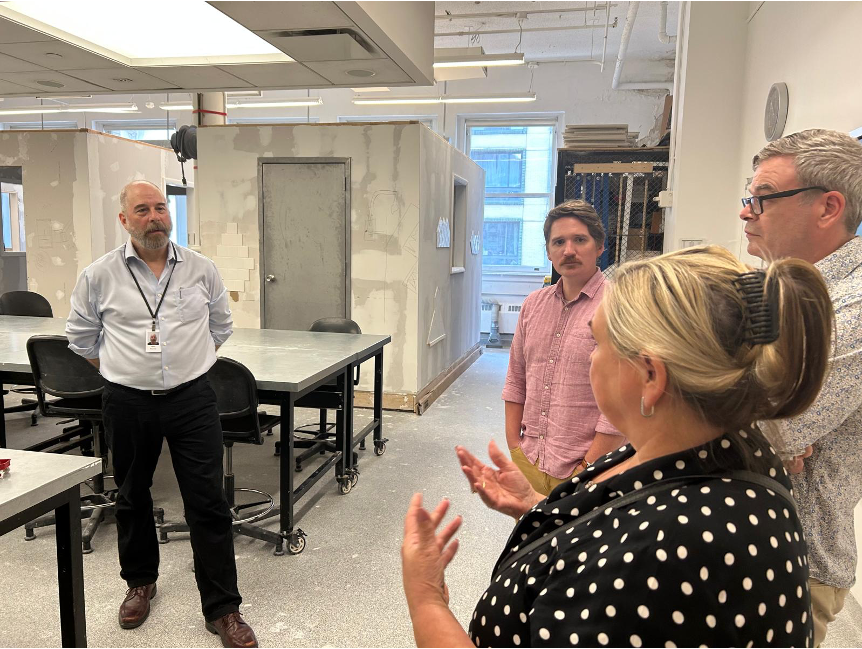Sharing knowledge from New York on creating good climate jobs
Prospect energy researcher, Thomas Weston, reports from New York on the work being done by campaigners and trade union colleagues in the United States to maximise the economic benefits of the clean energy transition, considering what lessons we can learn as the work of Climate Jobs UK gets underway.
In a related article, Thomas looked at the role that our energy system must play in tackling the climate crisis and reveals what our energy members are telling us about the challenges we face in decarbonising our economy.
Putting workers and good jobs at the centre of the clean energy transition

Advocating for the creation of good, skilled and well-paid jobs as part of the clean energy transition, and outlining plans how it can be done, is the focus of Climate Jobs UK, a new campaign group founded by Prospect and our colleagues at the GMB union.
The aim of Climate Jobs UK is to put clean energy jobs and workers at the centre of the UK’s transition to a low carbon future, ensuring the UK maximises the economic benefits of the transition.
If we do not do this, if the transition is focussed on closing down carbon-intensive infrastructure, rather than building what comes next and ensuring good jobs are created as a result, the transition risks losing support.
This is the implication of recent polling conducted by Climate Jobs UK, which found that a significant majority of the public thought that the energy transition should prioritise jobs and the economy (55%) over speed (17%), with just 8% saying that the transition had led to good jobs in their area so far.
Support from the US
In setting up Climate Jobs UK, we are being supported by the US based Climate Jobs Institute and the associated Climate Jobs National Resource Centre.
The CJNRC is a labour-led institution that has a history of working with trade unions and building up coalitions to advocate for pro-worker, pro-climate action agendas at the state-level. The CJI, based at Cornell University’s Industrial and Labor Relations School in New York City, is the applied research and education partner of the CJNRC.
In July 2025, a delegation of officials and members from Prospect and GMB, who are involved in setting up Climate Jobs UK, visited New York for a week to have a series of discussions with both organisations and to visit local trade unions who had worked with them and benefitted from involvement with the local state-level coalition, Climate Jobs New York.
The week began with an introduction to the work of the CJI and CJNRC. A key principle of their work is to focus on the new, rather than the old.
They understand the importance of a just transition and of supporting workers whose jobs are at risk, but they recognise that other actors are better placed to advocate for those workers, and that what is really needed is organisations putting forward detailed plans which outline how new, clean energy infrastructure can be built out in a way which supports good, unionised jobs.
This is exactly what they aim to provide, by building up labour-led coalitions at the state level and providing research and policy support to help them develop pro-worker, pro-climate policy platforms.
The Presidential advisor
After discussing some effective state-level campaigns, John Podesta, Senior Advisor to President Biden for Clean Energy Innovation and Implementation, 2022-25, joined for a discussion about energy policy at the national level.
Among other things, the discussion focussed on how the Inflation Reduction Act had spurred clean energy investment and how its policy support schemes incentivised the use of union labour.
There was also a discussion about how to create change which is durable. John’s answer to this was to create ‘facts on the ground’ as quickly as possible—a future government may seek to cut policy schemes or subsidies, but they cannot cancel construction projects which are well underway or projects which are already built and generating energy.
Meeting local unions
In addition to having planning conversations for Climate Jobs UK and discussing its future work programme, the delegates spent much of the rest of the week meeting with local trade unions and visiting their training centres.
The first of these was 32BJ, a building services union. Among other things, they explained their training system provided a tour around their training facilities. In contrast to the UK, US trade unions deliver a significant amount of training themselves.
Trade unions there work with employers to develop schemes which will train their members and provide the employers with the skills they need. The system is relatively flexible, as when employers start to adopt clean energy technologies and their employees need new skills (e.g. for heat pump installation), the relevant trade union works with the relevant employer to develop a training programme, with the employer providing the funding.

Prospect rep Audrey Uppington on a visit to 32BJ’s carpentry training room
There was also a visit to the Local 3 branch of the International Brotherhood of Electrical Workers. They explained how they supported electrical workers throughout their career.
They take on members as apprentices, provide them with free training throughout their career, supporting them into well paid work. Their union membership also means that they have medical and unemployment insurance to fall back on during periods in which they might be out of work.
Lessons on skills
The operating model of these US trade unions is clearly different to how trade unions work in the UK. However, there are still lessons to be learned, particularly in terms of skills training.
It was notable how US colleagues talked about skills in a completely different way to our UK delegates. In the UK, we’re constantly talking about skills as a barrier that needs to be overcome if the government’s objectives are to be achieved or if certain projects are to be built and operated.
The survey evidence mentioned in my first article is an example of why this is, for key areas we simply do not have enough skilled workers—either in post or being trained—to do the work that needs to be done over the coming years.
However, US colleagues have a completely different perspective. Of course, they have their own political and policy challenges to deal with, but skills isn’t one of them. It is understood that the employer is responsible for ensuring there is enough skilled labour available to deliver their projects, and when there isn’t, it is their responsibility to implement training schemes and pipelines to ensure that there will be.
It is unlikely that we will see trade unions in the UK delivering vocational training programmes any time soon, but we could certainly benefit from there being a more nimble training system along these lines, where employers are expected to work with relevant training partners to provide for the skills they need when they are committing to projects and preparing to deliver them.
Working with environment groups
On the last day of the trip, the delegation met with John Murphy, International Representative for the United Association of Journeymen and Apprentices of the Plumbing and Pipe Fitting Industry.
John explained how his union had built a coalition with environmental campaign groups and utility companies to advocate for and pass legislation initiating a series of Thermal Energy Network pilots in New York. TENs are a sustainable solution for decarbonising domestic heating and stand to provide John’s members with good quality pipefitting jobs well into the future if the pilots are successful and TENs are rolled out further.
Lastly, there was a meeting with Mike Hellstrom, Eastern Regional Manager of the Laborers International Union of North America, a construction union which has worked closely with the CJI and the local state-level coalition, Climate Jobs New York.
Mike spoke encouragingly about how these organisations have helped unions raise their profile in the state. Previously, the creation of good union jobs was an afterthought when projects were being developed, if they were considered at all.
Now, it is one of the first things that politicians and policymakers want to be assured of before they consider signing off on new projects.
If Climate Jobs UK can do something similar for the UK, it will have served its purpose.
Read the related article from Prospect energy researcher Thomas Weston, on the role that our energy system must play in tackling the climate crisis and reveals what our energy members are telling us about the challenges we face in decarbonising our economy.
Putting workers and good jobs at the centre of the clean energy transition
